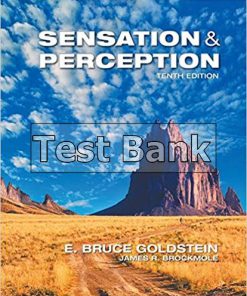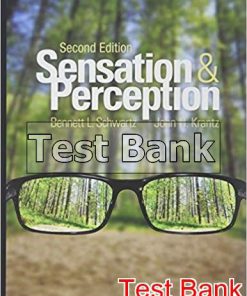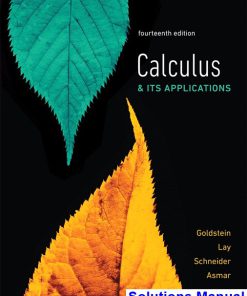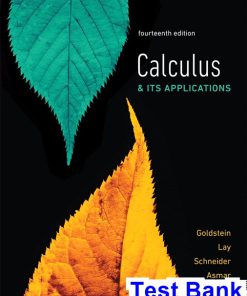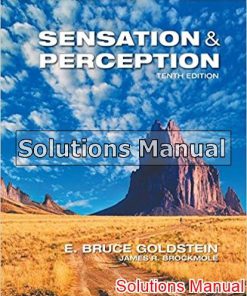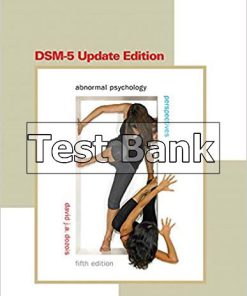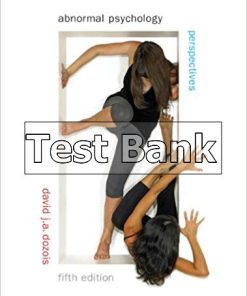Sensation and Perception 9th Edition Goldstein Test Bank
$50.00 Original price was: $50.00.$26.50Current price is: $26.50.
Sensation and Perception 9th Edition Goldstein Test Bank.
This is completed downloadable of Sensation and Perception 9th Edition Goldstein Test Bank
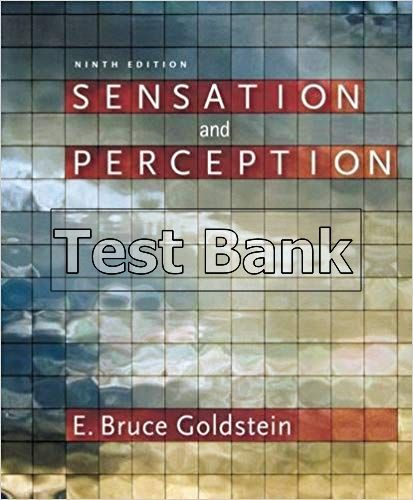
Product Details:
- ISBN-10 : 1133958478
- ISBN-13 : 978-1133958475
- Author: E. Bruce Goldstein
Long regarded as the gold standard in sensation and perception texts, E. Bruce Goldstein’s SENSATION AND PERCEPTION has helped more than 100,000 students make the connection between perception and physiology. Goldstein has crafted an easier-to-understand, and more student-friendly book, without sacrificing the text’s comprehensive examination of sensation and perception. Goldstein takes readers on an intriguing journey through their senses, and chronicles scientists’ efforts to understand the fascinating behind the scenes activity that allows us to perceive. With balanced coverage of all senses, this book offers an integrated examination of how the senses work together. Goldstein shows readers how seemingly simple experiences are actually extremely complex mechanisms and examines both the psychophysical and physiological underpinnings of perception. All material is presented in a way students find interesting and easy to follow. The book’s visually dynamic presentation includes numerous color plates that are presented as visual topic essays. In addition, more than 50 hands-on demonstrations illustrate perceptual experiences. All are simple enough for students to do and are seamlessly integrated into the flow of the text.
Table of Content:
- Ch 1: Introduction to Perception
- Chapter Contents
- Some Questions We Will Consider:
- Introduction
- Why Read This Book?
- The Perceptual Process
- How to Approach the Study of Perception
- Measuring Perception
- Something to Consider: Threshold Measurement Can Be Influenced by How a Person Chooses to Respond
- The Road From Here
- Think About It
- Key Terms
- Media Resources
- Ch 2: The Beginnings of Perception
- Chapter Contents
- Some Questions We Will Consider:
- Introduction
- Starting at the Beginning
- Light and Focusing
- Receptors and Perception
- Electrical Signals in Neurons
- Neural Convergence and Perception
- Something to Consider: Early Events Are Powerful
- Think About It
- Key Terms
- Media Resources
- Ch 3: Neural Processing and Perception
- Chapter Contents
- Some Questions We Will Consider:
- Introduction
- Lateral Inhibition and Perception
- Processing From Retina to Visual Cortex and Beyond
- Do Feature Detectors Play a Role in Perception?
- The Sensory Code
- Something to Consider: The Mind–Body Problem
- Think About It
- Key Terms
- Media Resources
- Ch 4: Cortical Organization
- Chapter Contents
- Some Questions We Will Consider:
- Introduction
- The Organized Visual System
- An Exploration of Spatial Organization
- Streams: Pathways for What, Where, and How
- Modularity: Structures for Faces, Places, and Bodies
- Something to Consider: Where Vision Meets Memory
- Think About It
- Key Terms
- Media Resources
- Ch 5: Perceiving Objects and Scenes
- Chapter Contents
- Some Questions We Will Consider:
- Introduction
- Why Is It So Difficult to Design a Perceiving Machine?
- Perceptual Organization
- Perceiving Scenes and Objects in Scenes
- Connecting Neural Activity and Object Perception
- Something to Consider: Are Faces Special?
- Think About It
- Key Terms
- Media Resources
- Ch 6: Visual Attention
- Chapter Contents
- Some Questions We Will Consider:
- Introduction
- Scanning a Scene
- What Directs Our Attention?
- What Happens When We Attend?
- What Happens When We Don’t Attend?
- The Distracting Effect of Task-Irrelevant Stimuli
- Attention and Experiencing a Coherent World
- Something to Consider: Attention in Autism
- Think About It
- Key Terms
- Media Resources
- Ch 7: Taking Action
- Chapter Contents
- Some Questions We Will Consider:
- Introduction
- The Ecological Approach to Perception
- Navigating Through the Environment
- Acting on Objects
- Observing Other People’s Actions
- Something to Consider: Action-Based Accounts of Perception
- Think About It
- Key Terms
- Media Resources
- Ch 8: Perceiving Motion
- Chapter Contents
- Some Questions We Will Consider:
- Introduction
- Functions of Motion Perception
- Studying Motion Perception
- Motion Perception: Information in the Environment
- Motion Perception: Retina/Eye Information
- Motion Perception and the Brain
- Motion and the Human Body
- Representational Momentum: Motion Responses to Still Pictures
- Something to Consider: Event Perception
- Think About It
- Key Terms
- Media Resources
- Ch 9: Perceiving Color
- Chapter Contents
- Some Questions We Will Consider:
- Introduction
- Introduction to Color
- Trichromatic Theory of Color Vision
- Color Deficiency
- Opponent-Process Theory of Color Vision
- Color in the Cortex
- Color Constancy
- Lightness Constancy
- Something to Consider: Color Is a Construction of the Nervous System
- Think About It
- Key Terms
- Media Resources
- Ch 10: Perceiving Depth and Size
- Chapter Contents
- Some Questions We Will Consider:
- Introduction
- Oculomotor Cues
- Monocular Cues
- Binocular Depth Information
- The Physiology of Binocular Depth Perception
- Perceiving Size
- Visual Illusions
- Something to Consider: Depth Information Across Species
- Think About It
- Key Terms
- Media Resources
- Ch 11: Hearing
- Chapter Contents
- Some Questions We Will Consider:
- Introduction
- The Perceptual Process for Hearing
- Physical Aspects of Sound
- Perceptual Aspects of Sound
- From Pressure Changes to Electricity
- Vibration of the Basilar Membrane
- The Physiology of Pitch Perception
- Something to Consider: How to Damage Your Hair Cells
- Think About It
- Key Terms
- Media Resources
- Ch 12: Auditory Localization and Organization
- Chapter Contents
- Some Questions We Will Consider:
- Introduction
- Auditory Localization
- The Physiology of Auditory Localization
- Hearing Inside Rooms
- Auditory Organization: Scene Analysis
- Auditory Organization: Perceiving Meter
- Returning to the Coffee Shop
- Something to Consider: Connections Between Hearing and Vision
- Think About It
- Key Terms
- Media Resources
- Ch 13: Speech Perception
- Chapter Contents
- Some Questions We Will Consider:
- Introduction
- The Speech Stimulus
- The Variable Relationship Between Phonemes and the Acoustic Signal
- Perceiving Phonemes
- Perceiving Words
- Speech Perception and the Brain
- Something to Consider: Speech Perception and Action
- Think About It
- Key Terms
- Media Resources
- Ch 14: The Cutaneous Senses
- Chapter Contents
- Some Questions We Will Consider:
- Introduction
- Overview of the Cutaneous System
- Perceiving Details
- Perceiving Vibration
- Perceiving Texture
- Perceiving Objects
- Pain
- Something to Consider: The Effect of Observing Touch and Pain in Others
- Think About It
- Key Terms
- Media Resources
- Ch 15: The Chemical Senses
- Chapter Contents
- Some Questions We Will Consider:
- Introduction
- The Taste System
- The Neural Code for Taste Quality
- Individual Differences in Tasting
- The Olfactory System
- Analyzing Odorants: The Mucosa and Olfactory Bulb
- Representing Odors in the Cortex
- The Perception of Flavor
- Something to Consider: The Proust Effect: Memories, Emotions, and Smell
- Think About It
- Key Terms
- Media Resources
- Epilogue: The Long and Winding Road
- Appendix: Signal Detection Theory
- Glossary
- References
- Name Index
- Subject Index
People Also Search:
sensation and perception goldstein
sensation and perception 9th edition goldstein
sensation and perception
sensation and perception 9th edition
sensation and perception 9th edition testbank download pdf
sensation and perception 9th edition download scribd
Instant download after Payment is complete
You may also like…
Solutions Manual




